PULLING GRADS TO MISSISSIPPI OR INVESTMENTS DOWN THE DRAIN?
For his second term, Tate Reeves has made it a priority to develop Mississippi’s economy. However, some students looking toward graduation and their careers are pessimistic about the future job outlook within the state.

complishments over the past four years. Among other priorities, Reeves talked at length about the economic accomplishments of his administration. Most notably, he emphasized a deal with Steel Dynamics, Inc. that was signed last fall, culminating in a $2.5 billion investment in Mississippi — the largest in state history.
He also laid out his priorities for Mississippi’s economic future, stating his desire to create an environment where students can stay in the state for their careers, promising economic projects that would, “fundamentally change lives and transform our state for the better.”
Students are divided on whether these plans encourage them to stay in Mississippi.
At the University of Mississippi, 53.1% of students attending the university’s Oxford and regional campuses are not residents of the state, according to institutional enrollment data. For many, Mississippi is a place to get their degree, not a final destination.
Amelia Grimsted, a junior English major on the pre-law track at UM, is originally from Washington. Grimsted plans on leaving Mississippi after obtaining her undergraduate degree to enroll in law school, citing in part the scarcity of law careers in the state.
“I’m not super hopeful about his policies. I’m not sure he’s headed in the best direction for Mississippi as a whole,” Grimsted said when asked about Reeves’ economic priorities.
Madison Silva, also a junior English major on the pre-law track, agreed.
“There’s more opportunity elsewhere,” the Arizona native said. She explained that she has no plans to stay in Mississippi after she obtains her undergraduate degree. Neither Silva nor Grimsted felt equipped to offer a solution to Mississippi’s economic woes. This uncertainty about the economy and job market in Mississippi has contributed to severe brain drain, a phenomenon in which

BASEBALL LOSES HOME OPENER
Ole Miss Baseball, coming off a disappointing stint in Hawai’i, continued their struggles against the Arkansas State Red Wolves in the home opener, losing 4-2.

AYERS AND ADMISSIONS
As the university takes big steps to accommodate more students, many have questioned why the university does not simply pump the brakes on enrollment. The answer, it turns out, is complicated.
MISSISSIPPIAN THE Daily theDMonline.com Thursday, February 22, 2024 Volume 112, No. 19
REEVES
GRAPHIC: MILO GILDEA
SEE
PAGE 3
SEE PAGE 10
SEE PAGE 4
SOURCE: 2020-23 FISCAL YEAR MISSISSIPPI DEVELOPMENT AUTHORITY ANNUAL REPORTS. OFFICE OF THE STATE AUDITOR, MONEY DOWN THE BRAIN DRAIN: ARE TAXPAYERS GETTING THEIR MONEY’S WORTH? (2022)
Take it on or give it up: Oxford observes Lent
NOAH WALTERS thedmnews@gmail.com
For many, Wednesday, Feb. 14 was all about hearts, flowers and the color pink. For others, the day had an additional meaning: People across the world bore dark, smudged crosses on their foreheads in observance of Ash Wednesday, a Christian holy day marking the beginning of Lent.
Students turned out in droves to receive their ashes, a symbol of repentance and devotion to God.
“We have an explosion of people that come to Ash Wednesday services,” Father Mark Shoffner of UM’s Catholic Campus Ministry said. “Probably 800 more people than we’d normally get on a Sunday.”
With this influx of students entering St. John the Evangelist Catholic Church in Oxford comes an increase in church involvement, at least in the beginning.
“There are a good number of them that maybe do take it to mean a bit more regularized, intentional following of the Gospel that they believe in,” Shoffner said. “So they’ll come to mass extra, they’ll come to events at the church extra (and) they’ll be around here a little bit more.”
A penitent observance of the Christian faith, Lent commemorates the 40 days that Jesus Christ spent fasting in the desert. For the next 40 days, those who celebrate Lent will reflect on the life
of Jesus and ways they can grow in their faith, all in preparation for Easter Sunday on March 31.
Lent is frequently associated with giving up something for the purpose of spiritual self-improvement. Shoffner has given up sweets this Lent in order to use prayer over pleasure for consolation. There is, however, one thing you cannot give up for Lent.
“I have to remind people giving up a sin is not a proper Lenten penance,” Shoffner said. “You’re already not supposed to be doing the sin.”
There are unique ways of observing Lent, such as the digital application Exodus 90. The app is a 90-day program aimed at men that encourages intense asceticism, such as taking cold showers, foregoing sweets and refraining from television use.
“I took it on because several of my friends were taking it on as well, and I was encouraged by the idea of having this community of men that was doing this hard thing,” Noah Watson, a senior electrical engineering major, said. “It’s very difficult to pray or fast well if we’re isolated.”
Watson’s experience with Exodus 90 highlights not only the communal aspect that Lent can take on but also the ways in which the observance has been affected by the digital age. For junior Merritt Tompkins, a Southern studies major and student lead-
er at the Episcopal Church at Ole Miss, Lent illuminates the detrimental effects of social media.
“I think that people, especially students, are acutely aware of how much social media can rule their lives,” Tompkins said. “In the conversations about Lenten disciplines I’ve had, social media, and especially TikTok, come up as something to possibly ‘give up.’ A lot of people expressed it was a practice that they didn’t think they could successfully accomplish.”
But for the Rev. Allison Wehrung, the campus minister for Presbyterian student organization UKirk, social media’s relationship with Lent is a bit more nuanced.
“It’s a bit of a double-edged sword,” Wehrung said. “Social media can be a distraction or a way that we numb ourselves, and it can be a way for us to connect with people and build that community.”
Although people often think of Lent as a time of sacrifice, others observe it by taking on a new discipline that adds meaning to their life.
“This year, the practice that I added is inspired by an author named Courtney Ella. I’m an amateur birder, and so the practice that she invited people to participate in is quietly looking for birds like she does, but also paying attention to nature for 10 minutes a day,” Wehrung said. “Set a timer so you don’t even have to look at the watch and just pay attention and see what God offers up to you in that time.”

The observance is both communal and a time for growth, according to the Episcopal Church at Ole Miss faculty adviser Kristen Walker.
“Lent is a great opportunity to do something you have wanted to do that may take you a little outside of your comfort zone but that you know would be a great way for you to grow,” Walker said.
For all of the pastors interviewed, a firm emphasis remained on Lent’s purpose as a spiritual-
ly edifying season that turns the observer to God and as an experience that is open to everyone.
“It’s a good way for someone who is desiring to go further into that spiritual life that all of us have within us to voluntarily choose a better usage of our time, our energy and our goods so that we can be more spiritually aware to the voice of God that calls out to all people,” Shoffner said. “It’s not spring cleaning, but you can find stuff when you clean your room.”
TEDxUM hosts diverse set of speakers
tal health concerns later in life.
DENTON
TEDxUniversityofMississip -
pi hosted its ninth yearly event
Tuesday, Feb. 20, with talks focusing on topics like mental health, self-worth, identity and purpose.
TED is a non-profit organization that holds regular conferences with distinguished speakers who share their greatest ideas with the public. TEDx focuses on a specific community with guests and topics relevant to the area. Such was the case with the Tuesday event hosted by UM’s chapter of the organization.
“I thought all the speakers were insightful,” Ethan O’Neil, a freshman general business major, said. “I liked the message that you can be an artist in whatever you do. I can apply that to schoolwork or what I do outside of school.”
O’Neil’s appreciative words were in response to the presentation by Jason Bouldin, a nationally renowned artist who spoke about the importance of finding art in every profession, not just his own.
“Don’t fall for the wrong definition of what an artist is supposed to be,” Bouldin said. “Being an artist is nothing more than being sensitive to the issue or to the problem. What we name things matters. How we name ourselves matters.”
Bryn Loftness, a doctoral candidate in the complex systems and data science program at the University of Vermont, presented her work on identifying underlying factors of mental health problems in children. She explained her hope that by addressing these risks sooner, children will have more tools to deal with men-
“It is clear that in order to live as healthier adults, we must ensure that children can access the care they need when they need it most,” Loftness said. “My day-today work revolves around creating new, data-driven solutions that can improve mental health across different and diverse populations.”
Reece Nighswander, a sophomore mathematics major, appreciated Loftness’ perspective on mental health.
“This was my first TEDx conference, and I really enjoyed the overall atmosphere and the talks,” Nighswander said. “I think my favorite was about finding mental health indicators sooner rather than later. It’s something I resonate with, as my mom is doing her Ph.D in similar work.”
Jaylin Smith, a second-year graduate student in journalism at UM, presented her experience as a Black woman and how the hair of all Black women should not be restricted by cultural expectations, but instead should be emblematic of their strength and perseverance.
“We must learn to love our hair the way our hair loves us because the world is watching,” Smith said. “Black hair is wild and unpredictable and beautifully crafted like waves in the ocean; it cannot be settled by the sands of social normalities.”
After the event, Smith shared a message for UM students, encouraging them to be their authentic selves.
“I think whatever color you are, whatever creed, whatever ethnic background you come from, be your authentic self and whatever room you go into, someone will
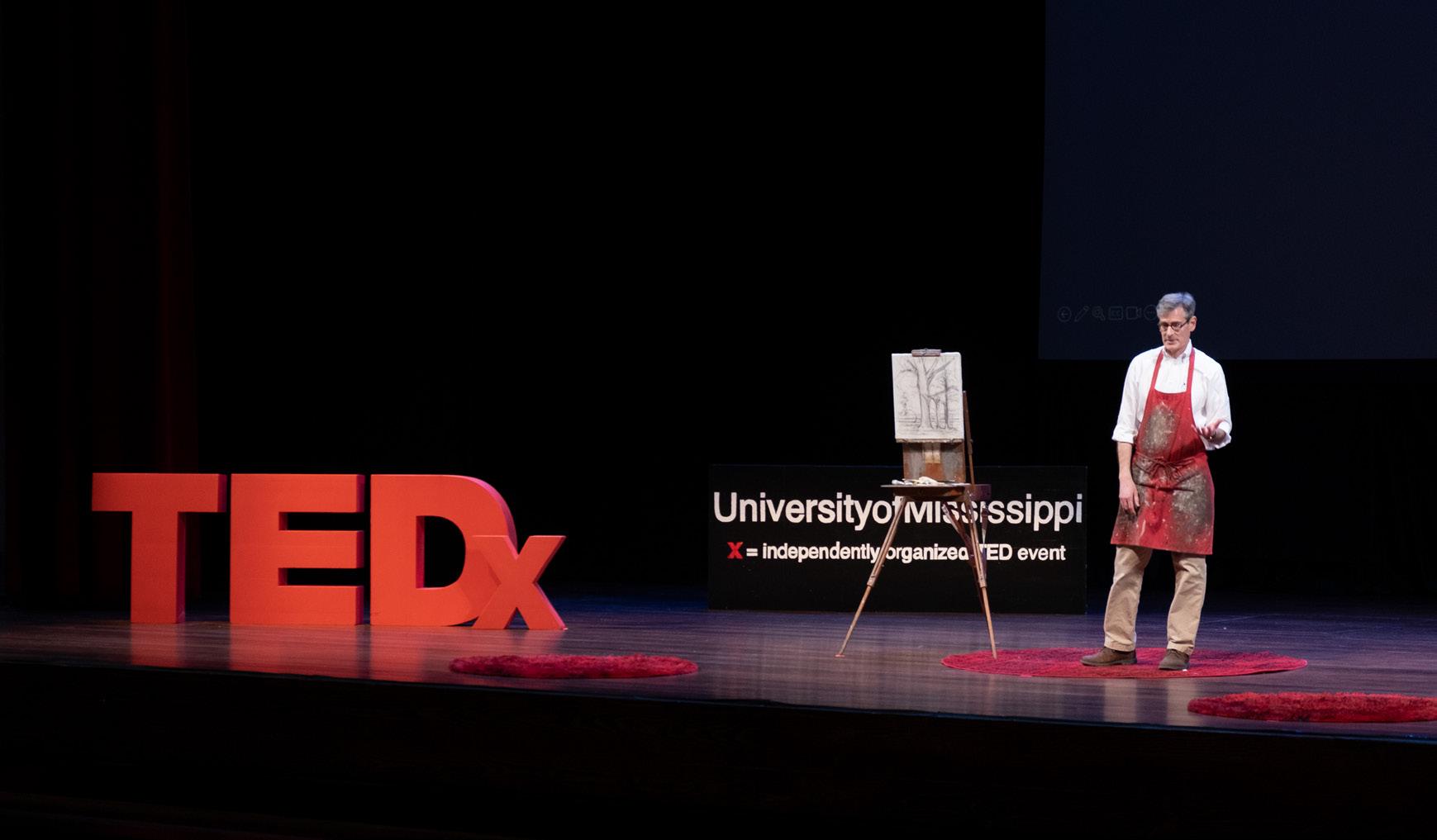
notice,” Smith said. “Know that there are going to be people who are rooting for you in those rooms, even when you’re not in them.”
Another speaker at the event, Dr. Alisha Rai, a family physician practicing in Calgary, Alberta, Canada, shared her story of becoming a mother, encouraging others to be aware of the struggles faced by those with infertility.
“As a society, let’s change the notion that if it doesn’t happen naturally and effortlessly, that it just wasn’t meant to be,” Rai said. “For many, the journey to motherhood is one of perseverance, hard work and grit.”
Rai ended her talk with advice for those struggling to have a child.
“Remember that your worth
and your identity is not based on the result at the end of a stick,” Rai said. “What do you call a woman who has had to work hard to have a child?
The answer is simple: Mom.”
Jasmine Kelley, the diversity education and strategic initiatives director at UM, spoke about the importance of asking questions and how doing so can help you make institutional change.
“At this time, our institutions have a unique obligation and opportunity to address the current social inequities regarding student success for all because of the core mission of our institutions,” Kelley said. “It involves transformative, equitable opportunities, operating within a standard of excellence
and inspiring diverse communities in ways that improve society.”
Kelley ended her talk with a challenge for students to embrace their decisions with intentionality and use those choices to make a difference.
Founder of Anubis Improv in New Orleans and Oxford, David James Hamilton rounded out the night’s speakers with a talk about the importance of his craft.
“I genuinely believe the art of improv is for everyone,” Hamilton said. “If we’re all going to be improvising our way through life anyway, why not try to approach that experience being open to discovering new opportunities and exploring those opportunities with a sense of wonder?”
PAGE 2 | THE DAILY MISSISSIPPIAN | 22 FEBRUARY 2024
JENKINS thedmnews@gmail.com
Episcopal Rev. Kirk LaFon, who serves as chaplain of the Episcopal Church at Ole Miss, distributes ashes to a student in the Union Plaza on Ash Wednesday in 2020.
FILE PHOTO MASON SCIONEAUX/ THE DAILY MISSISSIPPIAN
Jason Bouldin kicks off the TedxUM speaker series in the Ford Center on Feb 20, 2024.
ANTONELLA RESCIGNO / THE DAILY MISSISSIPPIAN
REEVES
continued from page 1
skilled, university-educated people living in an area migrate out in such vast numbers that the local economy is threatened.
According to a report released by the Mississippi Office of the State Auditor in April 2022 titled “Money Down the Brain Drain,” half of all Mississippi college students who graduated between 2015 and 2017 left the state within three years of receiving their diplomas. Graduates of UM specifically were the most likely to leave to seek employment elsewhere among all other universities in the state.
A followup report, “Plugging the Brain Drain: Investing in College Majors That Actually Work,” was released by the State Auditor’s Office in September 2023. A solution was proposed to help alleviate the effects of the brain drain: cutting funding for liberal arts degrees at state universities and colleges.
State Auditor Shad White defended this proposed solution, arguing that funneling students into majors that provide more employment opportunities and higher earnings will make the investment of state taxpayers more efficient, as well as deriding certain liberal arts degrees as “useless,” “garbage” and “indoctrination factories” in a series of tweets.
Silva, in pursuit of a liberal arts major herself, disagrees with Shad White’s rhetoric.
“I would strongly disagree with both statements, as I think there is a great need for liberal arts degrees,” Silva said. “From those degrees you gain lawyers, psychologists, anthropologists. What would our world look like without them?”
Leaving the state is not at the top of Mississippi native and junior biology major Josh Williams’ bucket list, but rather a pragmatic decision made for the sake of his career. Williams, who plans on being a physician’s assistant specializing in orthopedics, also perceives a lack of opportunity in the state.
“If I got a really good job offer, I would plan on staying. I’m not opposed to staying, but I know that the job offers are lower here as far as base salaries,” Williams said.
Williams spoke frankly about his outlook on Mississippi and its future.
“I feel like we’re last to progress,” Williams said.
As recently as January, there has been controversy over the way money has been distributed throughout the state. Early in his second
VIOLET JIRA editor-in-chief dmeditor@gmail.com
HAL FOX managing editor dmmanaging@gmail.com
REESE ANDERSON copy chief thedmcopy@gmail.com
KHARLEY REDMON enterprise news editor thedmnews@gmail.com
ASHLYNN PAYNE news editor thedmnews@gmail.com
JUSTICE ROSE opinion editor thedmopinion@gmail.com
term, Reeves called a special session asking the Mississippi Legislature to appropriate at least $350 million of state funds to secure a $1.9 billion project in Marshall County. The green energy plant, a joint venture involving automakers and technology companies, is expected to create 2,000 jobs.
The special session helped Reeves achieve his goal, but not without drawing criticism from several Democratic lawmakers who, in an interview with Mississippi Today, said that Reeves was biased against certain parts of the state, such as the majority-Black Delta.
Williams disagreed, citing the need to focus development in areas where it already exists.
“I think to get Mississippi more advanced, you have to focus on places that are already advancing,” Williams said.
Deputy Chief of Staff Cory Custer of the Mississippi Development Authority, a state agency focused on economic and community development, disagreed with Democratic lawmakers’ allegations as well, contesting the premise that the state government was wholly in charge of choosing the location of the plant.
“Democrat lawmakers are not accurate in their claim,” Custer said. “Gov. Reeves supports investing in all of Mississippi. Private companies — not state governments — determine which sites best meet their needs. This project will help strengthen our state’s economy, which is a benefit to all Mississippians, including students. Gov. Reeves will continue to use every tool at his disposal to bolster every region of our state.”
Senior mechanical engineering major and Haley Barbour Center for Manufacturing Excellence student Nicholaus Greazel shares Custer’s positive sentiment about Reeves’ direction for Mississippi.
“Admittedly, I don’t know much about every detail of Gov. Reeves’ economic policies, or enough about economic policy to really have any suggestions. But, I’ve watched billions of dollars in industrial investments get poured into the state of Mississippi over the four years I’ve been in school here, so the strategy being implemented by the state government seems to be working,” Greazel said.
Greazel, originally from Illinois, plans on staying in-state after graduation, having accepted an engineering job with the Toyota Motor Manufacturing plant in Blue Springs, Miss.
CLAY HALE arts and culture editor thedmfeatures@gmail.com
CAROLINE MCCUTCHEN assistant arts and culture editor thedmfeatures@gmail.com
CAMERON LARKIN WILL ROMANO sports editors thedmsports@gmail.com
ASHTON SUMMERS photo editor thedmphotos@gmail.com
KENNEDI STANCIL assistant photo editor thedmphotos@gmail.com
According to Greazel, part of the solution for Mississippi’s job market might lie in specialized programs like the CME.
“Specialized programs are absolutely an incentive to bring industry projects into the state,” Greazel said. “The Center for Manufacturing Excellence was founded at Toyota’s request when the Corolla plant was being built in Blue Springs.
Even before the CME, the Center for Advanced Vehicular Systems was founded at Mississippi State (University) with the goal of attracting Nissan’s manufacturing. Programs such as these provide crucial support to industry through targeted research and workforce development, which absolutely act in Mississippi’s favor when companies are choosing where to develop plants.”
Development projects directed by the MDA may help alleviate brain drain.
“Just last month, Mississippi finalized the largest economic development project in state history — a $10 billion private sector investment by Amazon Web Services that will create 1,000 high-paying, high-tech jobs,” Custer said. “The state has invested billions toward improving infrastructure, and has been proactive in modernizing Mississippi’s ports, airports and railways. All of these actions help keep students in Mississippi.”
student Nicholaus Greazel shares Custer’s positive sentiment about Reeves’ direction for Mississippi.
“Admittedly, I don’t know much about every detail of Gov. Reeves’ economic policies, or enough about economic policy to really have any suggestions. But, I’ve watched billions of dollars in industrial investments get poured into the state of Mississippi over the four years I’ve been in school here, so the strategy being implemented by the state government seems to be working,” Greazel said.
Greazel, originally from Illinois, plans on staying in-state after graduation, having accepted an engineering job with the Toyota Motor Manufacturing plant in Blue Springs, Mississippi. According to Greazel, part of the solution for Mississippi’s job market might lie in specialized programs like the CME.
“Specialized programs are absolutely an incentive to bring industry projects into the state,” Greazel said. “The Center for Manufacturing Excellence was founded at Toyota’s request when the Corolla plant was being built in Blue Springs. Even before the
ERIN FOLEY LIBBY FLANAGAN design editors thedmdesign@gmail.com
SAVANNAH SHOOK AVERY THOMAS social media managers thedmsocialmedia@gmail.com
WILL JONES multimedia editor dailymissmedia@gmail.com
HAILEY AUSTIN online editor thedmonline@gmail.com
CME, the Center for Advanced Vehicular Systems was founded at Mississippi State (University) with the goal of attracting Nissan’s manufacturing. Programs such as these provide crucial support to industry through targeted research and workforce development, which absolutely act in Mississippi’s favor when companies are choosing where to develop plants.”
Development projects directed by the MDA may help alleviate brain drain.
“Just last month, Mississippi finalized the largest economic development project in state history — a $10 billion private sector investment by Amazon Web Services that will create 1,000 high-paying, high-tech jobs,” Custer said. “The state has invested billions toward improving infrastructure, and has been proactive in modernizing Mississippi’s ports, airports and railways. All of these actions help keep students in Mississippi.”

THE DAILY MISSISSIPPIAN | 22 FEBRUARY 2024 | PAGE 3
S. Gale denley student media center LARZ ROBERTS Director of Student Media DENNIS MOORE Editorial Director ROY FROSTENSON Assistant Director/Advertising OWEN PUSTELL Advertising Sales Manager dmads@olemiss.edu SALES ACCOUNT EXECUTIVES Dylan Sheu Lola Phillips Kendall Scott FOLLOW US THE DM NEWS TWITTER @thedm_news THE DM INSTAGRAM @thedailymississippian THE DM TOONS THE DM FACEBOOK @thedailymississippian INSTAGRAM @theDM.toons
----
THE DAILY MISSISSIPPIAN EDITORIAL staff
Why UM doesn’t ‘just accept fewer students’
PERCENTAGE OF OUT-OF-STATE, FIRST-TIME, FIRST-YEAR STUDENTS*
Since 2021, the University of Mississippi’s freshman class sizes have increased by 46% — from 3,584 to 5,240 freshmen in the 2023-2024 school year. Since the beginning of the fall semester, The Daily Mississippian has reported extensively about how this boom in enrollment is affecting the university community, from insufficient campus housing and longer lines for student union services to difficulty enrolling in already-full classes.
This unprecedented growth is a point of pride for the university, as it works each year to find new ways to accommodate more students. A university record 24,710 students enrolled across the school’s seven campuses in the fall. Still, many in the university community are asking the question: Why not just limit the number of students accepted?
Such a move would not be unprecedented.
In early 2023, the University of Tennessee’s Office of Undergraduate Admissions revealed that the number of first-year applicants had increased by a staggering 40.7%. This situation — a boom in first-year interest — should sound familiar.
UT answered by reducing the number of students it admitted.
“To deliver the best Volunteer experience for all students across all four years and in course offerings, residential experience and student life, UT will reduce the size of its first-year class and enroll fewer first-year students than last fall,” UT’s Office of Admissions said in a public statement.
UT’s acceptance rate fell to 59.4% for in-state applicants and 33.3% for out-ofstate applicants. Current -
ly, UM’s overall acceptance rate stands at 97%. So, why hasn’t the University of Mississippi done the same?
Part of the answer lies in Mississippi’s statewide admissions policy, dictated in large part by a historic 1992 ruling from the Supreme Court of the United States: United States v. Fordice. The court sided with the plaintiffs, agreeing that Mississippi had failed to sufficiently desegregate its higher education system. The resulting settlement among the plaintiffs, the United States and the state of Mississippi — finalized a decade later — is colloquially referred to as Ayers.
Stemming from a 1975 lawsuit alleging unequal treatment of Black and white students in Mississippi’s higher education system, the Ayers settlement required the state to take strides toward leveling the playing field. One policy aimed at addressing this statewide open admissions.
“The Ayers settlement originated from a 1975 lawsuit filed by a group of Black Mississippians, intending to address years of inadequate funding for the state’s three public Black colleges and eliminate barriers for students at predominantly white institutions,” Mississippi Institutions of Higher Learning’s Director of Student Services Sandra Kelly said.
Litigation of the Ayers lawsuit continued until a settlement was finalized in February 2002. With the settlement came changes. The state agreed to make payments and invest in capital improvements for its historically Black colleges and universities, such as Jackson State University and Mississippi Valley State University, which were underfunded relative to their predominantly-white counterparts. In total,
the state was ordered to pay $503 million towards equalizing Mississippi’s higher education system. Mississippi was also tasked with making its predominantly white education institutions more accessible to Black students.
“The nature of the case helped create more equitable educational opportunities in Mississippi by promoting a wider acceptance of open-admission policies,” Kelly said.
Currently, in-state students have access to all eight of Mississippi’s public universities, provided they meet certain criteria. The policy employs a sliding scale on which a combination of grade point average upon completion of the College Preparatory Curriculum, class rank and/or standardized test scores are evaluated to determine admissions eligibility. Even for high school students who do not meet the criteria, there is a path to education at Mississippi’s public institutions. Full details on the statewide admissions policy can be found on the IHL website.
This policy constitutes what is commonly referred to as “open-admissions.” For instate students, admission to UM is mostly noncompetitive.
“I think it helped level the playing field for all students by providing multiple routes of admission and providing academic resources for students who might not have otherwise been admissible at our state’s public universities,” Jody Lowe, UM’s director of admissions, said.
Because of the statewide open-admissions policy, a cap cannot be placed on the number of in-state students admitted to UM. There is essentially no restriction on the enrollment of out-of-state students, as well.
“Over the last 20 or so years,
30.5%
PERCENTAGE OF MISSISSIPPI RESIDENTS IN UM’s 2023-24
NEW FRESHMEN CLASS
Source: UM Office of Institutional Research, Effectiveness, and Planning
the university has maintained relatively the same admissions standards for Mississippi students as we have for out-of-state students,” Lowe said. “We do have language in place that allows us to limit admission more for non-resident students if capacity dictates that we need to reduce out-of-state enrollment.”
It is not UM’s goal to decrease enrollment. Rather, it is relishing this period of historic growth. Conversations about restricting outof-state admissions to alleviate pressure caused by enrollment are not on the table, according to University Marketing and Communications.
One reason may be that reducing the number of outof-state students is not a financially tenable option. Of the 2023-2024 school year’s freshman class, only 30.5% of students were Mississippi residents. The remaining 69.5% of freshmen are non-residents, who pay more than twice the tuition charged residents to attend UM. Revenue from tuition and fees makes up 78% of UM’s operating budget, according to IHL.
Additionally, leaders in Mississippi and nationwide are turning their attention toward the impending drop in the number of high school graduates, which, for higher education institutions like UM, threatens to present the opposite problem: not enough students. With the knowledge that the pool of prospective students is projected to shrink, it would not make sense for the university to scale back its enrollment, out-of-state or otherwise.
As for next school year, though, UM is anticipating another year of strong enrollment.
“It’s too early to make any
forecasts, but I would say that applications are very strong at this point for next fall,” Lowe said. “We have the potential to grow again. We do anticipate that there will be growth again next year.”
As part of the open-admissions process, the university will take applications for the 2024-2025 school year until the first day of fall classes.
Jim Zook, UM’s chief marketing and communications officer, assured that the university maintains a close eye on student experience and campus environment, pointing to the master leases and plans for new student housing as an example of ways UM is working to keep up with the rising student population. The university is constructing new student housing on campus – three residence halls will be built on the site of the recently demolished Kincannon Hall – in addition to a parking garage to accommodate more students.
The Ayers settlement was intended to last through mid2022. Though it has since expired, the open-admissions policy is unlikely to change.
“The university system is committed to empowering various learners, which can be achieved by ensuring educational opportunities are accessible to all students,” Kelley said. “Therefore, open-admission remains secure. Currently, IHL and academic leaders are collaborating to evaluate the existing admission standards to streamline processes for enhanced effectiveness.”
John Sewell, IHL’s director of communications, noted that the board of trustees has not engaged in discussions regarding amendments to its minimum admission criteria.
PAGE 4 | THE DAILY MISSISSIPPIAN | 22 FEBRUARY 2024
VIOLET JIRA thedmnews@gmail.com
*These figures do not include international students Source: 2022-23, 2021-22, and 2020-21 Common Data Sets Section F
2020-21
2021-22
UM UM UM MSU MSU MSU 42% 61% 57% 64% 41% 40% University of Mississippi,
State University
2022-23
Mississippi
VIOLET JIRA / THE DAILY MISSISSIPPIAN
When the spring semester commenced, students weren’t the only ones settling into Oxford. Donut Distillery and its rooftop bar counterpart, Rebel Yell, are making their homes next to Uno Mas on the Square.
The dream for Donut Distillery began when couple and co-founders Todd and Shauna McCoy started filling donut orders out of their home and a small food truck in Nashville.
“Our donuts became so popular among the community that my family and I began filling orders out of our house and food truck. We were overwhelmed with orders, and my kids were tired of going to school smelling like the Tennessee State Fair. So we decided it was time for a brickand-mortar,” Shauna McCoy said in an informational poster about the new location.
After seeing success at their Nashville and Houston locations and having two daughters graduate from the University of Mississippi, the McCoys wanted their third business to be in Oxford.
The eccentric design of Donut Distillery features colorful art, with everything from
Raise your glasses to Donut Distillery and Rebel Yell
hanging beads and neon signs to an “Instagram wall” where guests can have photo shoots and share pictures online.
The upbeat establishment is home to a unique combination: drinks and donuts. It offers custom mini donuts, mimosas, flights, spiked milkshakes and specialty coffee drinks, both alcoholic and nonalcoholic.
“I love coffee and donuts, so I’m super excited about Donut Distillery. I think this is really different from any other business I’ve seen in Oxford. I think the food and alcohol combo will do really well, especially with students,” Sydney Smith, a junior international studies major, said.
The McCoys saw Oxford’s nightlife scene as a perfect opportunity to try something new: a rooftop bar.
“This bar will be a different experience for us,” Shauna McCoy said. “For starters, we plan to keep this location open later because of foot traffic.”
The upstairs of the Donut Distillery building has been renovated into a rooftop bar called Rebel Yell, inspired by Billy Idol’s classic 1980s tune. After walking up a staircase lined with fun paintings, patrons find a unique, brightly-colored space.
“This is gonna be really cool

in the spring,” Shauna McCoy said. “When it gets warm outside, people can hang out outside in the nice weather.”
With an indoor and an outdoor space, Rebel Yell offers a new place for the Oxford community to relax and enjoy a drink while looking out onto Oxford Square. Although the
rooftop bar is separate from Donut Distillery, flights and drinks from downstairs can be brought up to customers.
“Throughout this journey, we have faced many challenges, but the boundless joy spread to many unique people has made it all worth it,” Shauna McCoy said. “We are
proud to have created a business that is more than just a donut shop, but a place where people can come together and create their own special moments. My husband and I take pride in our tight-knit relationships with our customers, community and each other as we revolutionize the donut.”
• Former Special Agent with the Federal Bureau of Investigation (FBI).
• Practiced at his privately owned law firm for 45 consecutive years - located at the same place, being the Oxford Square, Downtown, Oxford, Mississippi.




• Taught the Mississippi DUI Law and 5 different Criminal Law and Criminal Procedure courses each and every semester at the University of Mississippi for 29 consecutive years.
• A member of the Chancellor’s Trust at the University of Mississippi since 1981.
• Former Municipal Prosecutor for the City of Oxford, Mississippi for over 6 years.
• Former Municipal Court Judge for the City of Oxford, Mississippi for 8 years.
• Former Vice President and President of the Lafayette County Bar Association; member of the Mississippi Bar Association, etc.
• Appointed by the Mississippi State Bar to the Mississippi Commission on Attorney Ethics and Attorney Violations of the Canon of Ethics and All Mandatory Rules concerning the Practice of Law. Occupied the positions of Vice Chairman and Chairman and served for 18 years.
• A Founding Member of the National College for DUI Defense conducted at Harvard Law School.
• Selected as one of the Top 50 DUI Attorneys in Mississippi by the National Advocacy for DUI Defense.
• Selected as one of the Top 10 Best Attorneys of Mississippi in for Client Satisfaction Award by the American Institute of DUI/DWI Attorneys.
• Selected as one of the Top 100 Trial Lawyers by the National Trial Lawyers Organization.
• Recipient of the DISTINGUISHED AWARD OF MERIT for 1989 from the Mississippi State Bar given to one Attorney in the State each year for outstanding contributions to the practice of law.
• Voted “Best Attorney in Oxford, Mississippi” in the Grove’s Choice Awards.
• Member of the American Association of Premier DUI Attorneys
• Member of the National League of Renowned Attorneys - Top 1%
• Awarded the United States Congressional Medal of Distinction by RNCC.
• Member of the American Jurist Institute - Top 10 DUI/DWI Attorney for Mississippi
• Member of the American Society of Legal Advocates - Top 100 Criminal Defense Lawyers in the State of Mississippi
• Selected by the Attorney and Practice Magazine as one of Mississippi’s Top 10 Attorneys, et cetera.
Listing of these previously mentioned areas
THE DAILY MISSISSIPPIAN | 22 FEBRUARY 2024 | PAGE 5
ISABELLE FROST thedmnews@gmail.com
A sign hangs on the front of what will soon be home to Donut Distillery and Rebel Yell. Both establishments aim to open March 1.
LYN MOORE / THE DAILY MISSISSIPPIAN
of practice does not indicate any certification of expertise therein. 29449

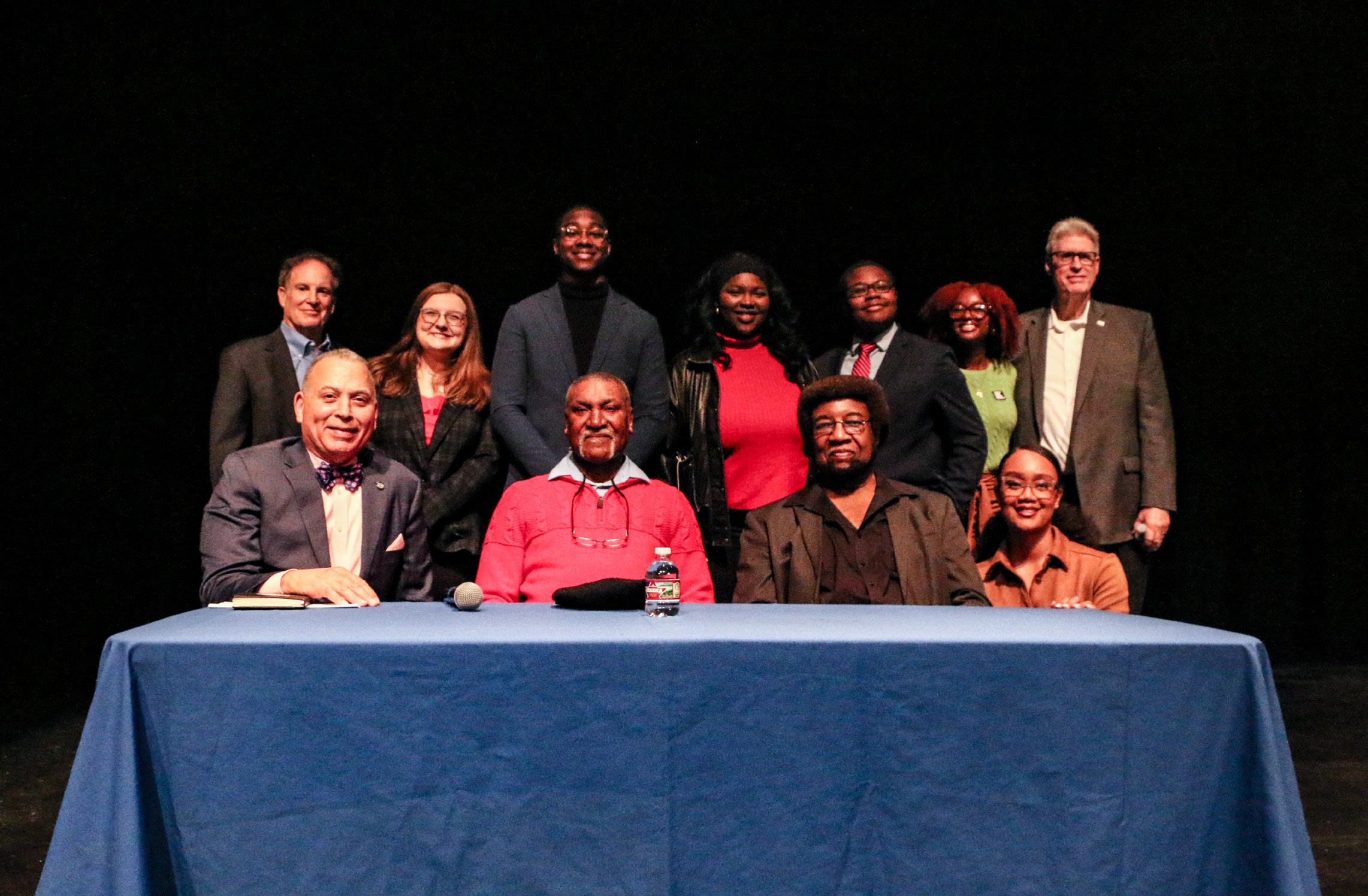
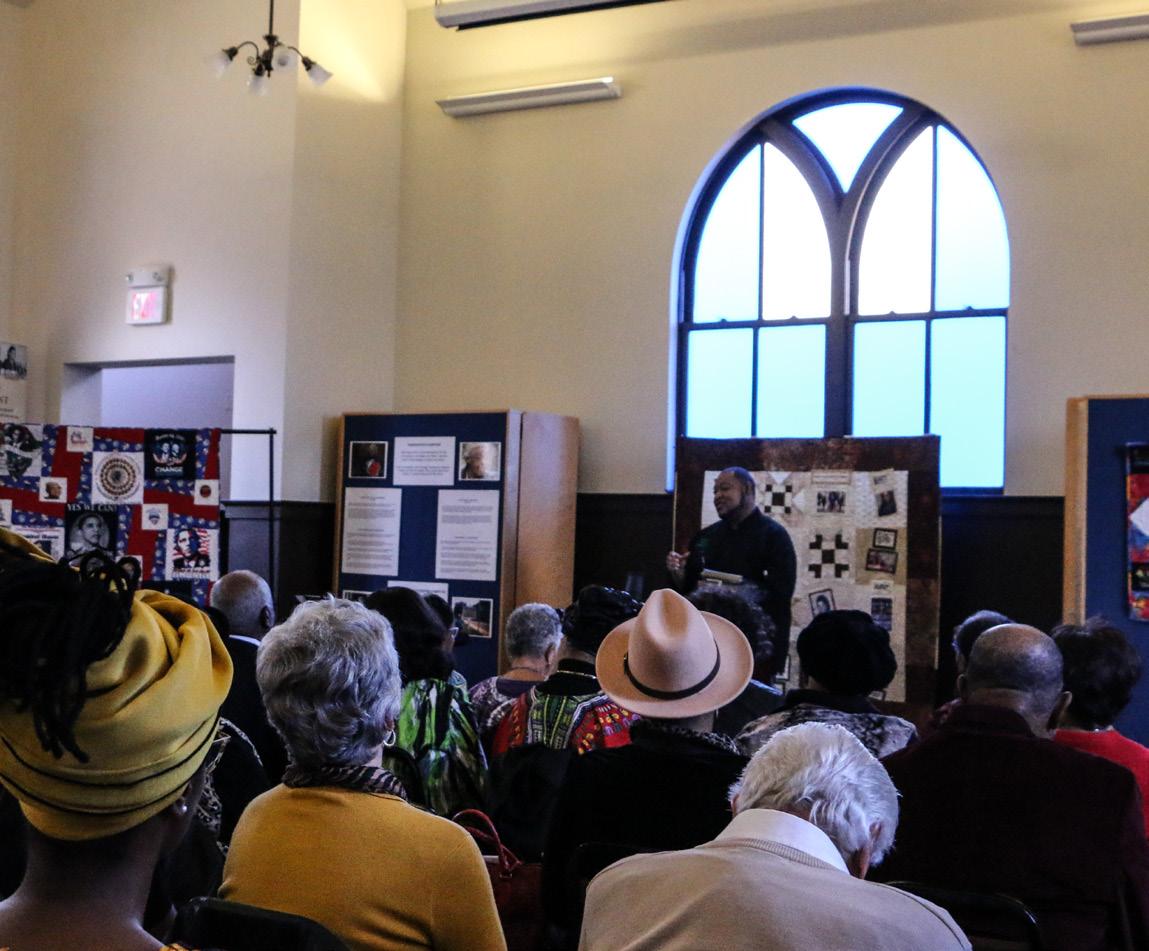
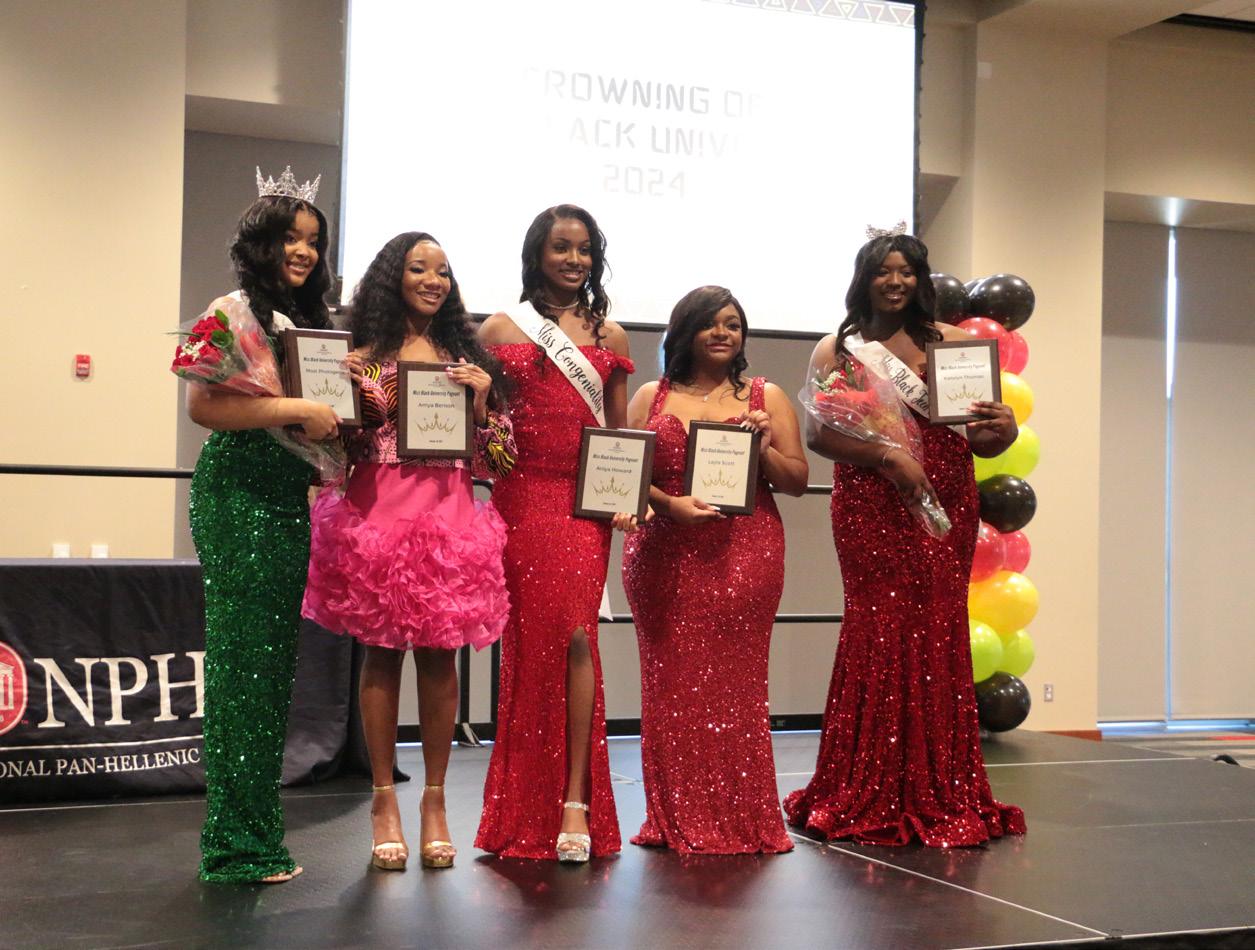
PAGE 6 | THE DAILY MISSISSIPPIAN | 22 FEBRUARY 2024
/
DAILY
Kayla Kashae’ Williams at the MLK service event on Feb. 17.
LYN MOORE
THE
MISSISSIPPIAN
ANTONELLA RESCIGNO / THE DAILY MISSISSIPPIAN
Panalists for the 27 Demands Event gather for a photo on Feb. 15.
ANTONELLA RESCIGNO / THE DAILY MISSISSIPPIAN
Quilt Show and Mixed Media Art Exihibit at the Burns-Belfry Museum on Feb. 17.
MARIA RAMIREZ / THE DAILY MISSISSIPPIAN HONORING BLACK HISTORY: LAST WEEK IN PHOTOS
The contestants of Miss Black University hold their awards in the Union Ballroom on Feb. 18.
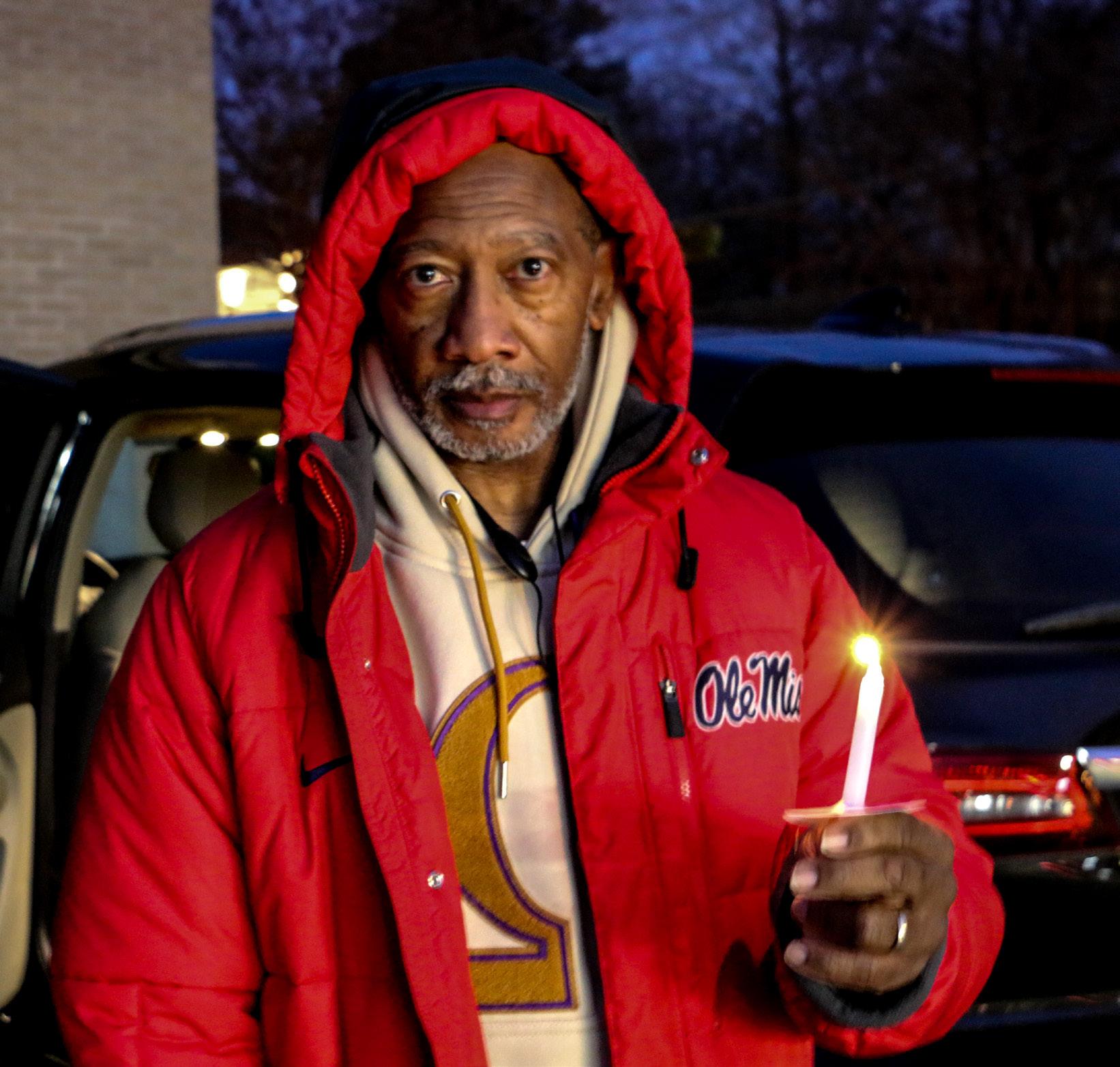
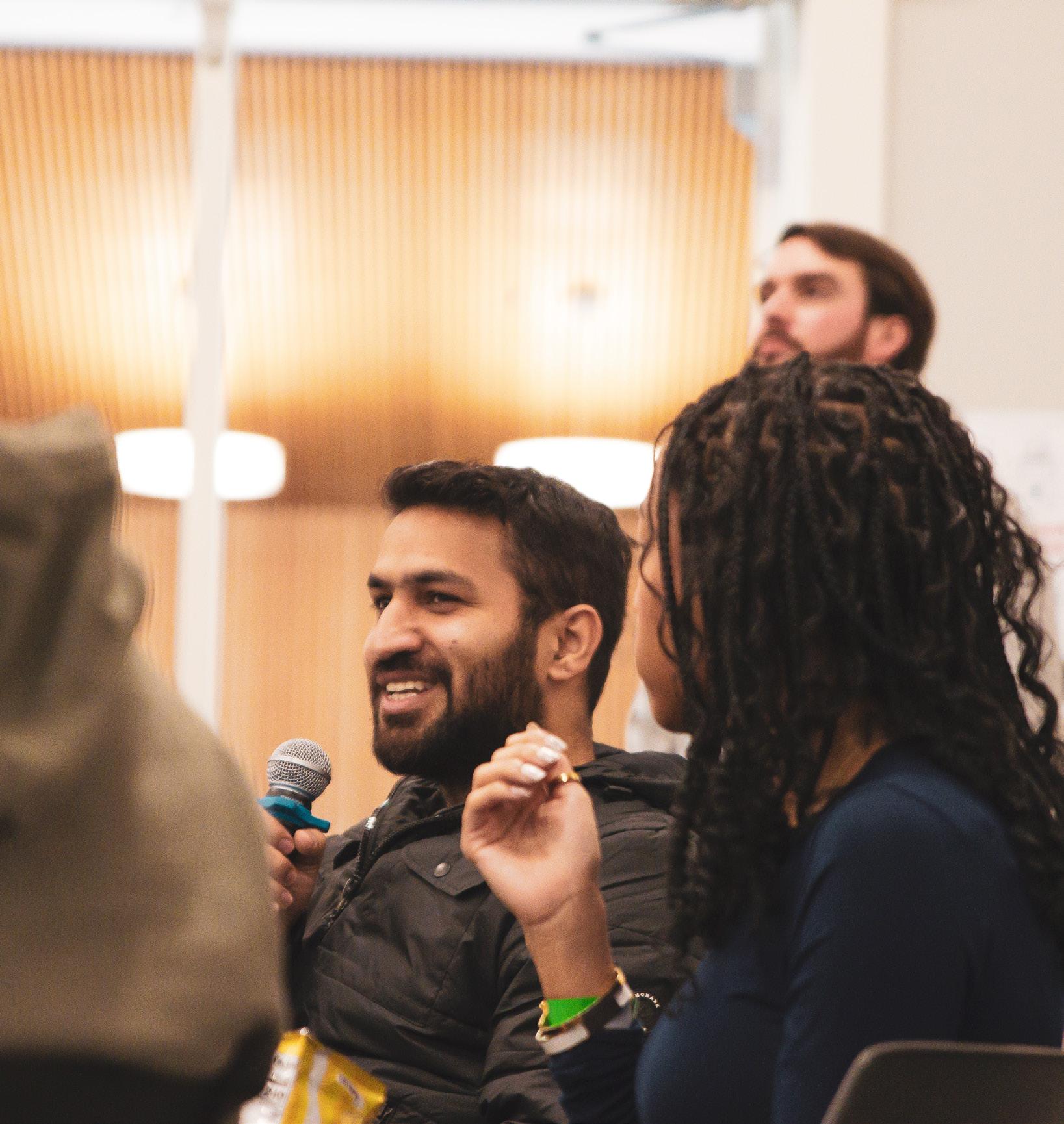


OPINION
Black History Month: the shortest month of the year
REN HITE thedmopinion@gmail.com
While many may immediately associate the month of February with Valentine’s Day or Groundhog’s Day, members of the African diaspora around the United States and the world celebrate the annual observance of Black History Month.
For the African American community, Black History Month is an opportunity to celebrate and uplift the voices and achievements of Black individuals throughout history and to revel in the elegance and pride of Black culture.
Since its conception, the celebration of Black History Month has spread from the confines of the United States to other countries and continents including Africa, the United Kingdom and Germany. Black History Month has been met with pushback since its founding.
Some critics of the holiday claim that acknowledging only the good deeds of Black activists and leaders will water down the seriousness of their stories and diminish their complexity as individuals.
Other critics, including actor Morgan Freeman, have criticized the duration of Black History Month for being too short, stating that, “Black history is American history.”
Sure, the acknowledgment of Black history can happen on any month in the calendar. Why is Black History Month celebrated in February, then, the shortest month of the year (even during a leap year)?
The immediate answer is that it could be racism, and oftentimes when it comes to American history, that is the answer. But the story of Black History Month is much more complex.
The notion of a Black History Month was conceived in 1926 by historian Carter G. Woodson and the Association for the Study of Negro Life and History. Woodson and the ASNLH wanted the achievements and history of Black individuals in America to be integrated into America’s educational curricula.
They chose the second week of February to celebrate “Negro History Week,” because Feb. 12 is the birthdate of Abraham Lincoln, and Feb. 14 is the assumed birthdate of Frederick Douglass, famous writer, abolitionist and civil rights activist. These dates were widely celebrated by African Americans beginning in the late 19th century, so Woodson wanted the week to coincide with those dates.
In its first year, the reaction to the newly proposed holiday was mild. However, several school boards in states with large African American populations supported celebrating the week. This support transmitted the holiday across American schools over the following decades.
In 1969, educators and students at Kent State University proposed to extend the holiday from a week to a month, and thus created the first Black History Month in February 1970.
In the following years, the holiday gained traction around the country, and only six years later, Black History Month was celebrated nationally. Then President Gerald Ford recognized Black History Month during the celebration of the United States’ bicentennial in 1976. This recognition cemented the national acceptance of Black History Month.
Ultimately, we know that you can celebrate Black history any and every day of the year, and in my opinion, we should. The sanctity and uniqueness of the Black experience in America and worldwide cannot be compressed into one month in the year or even a whole year.
Now, to the aforementioned question: Is Black History Month celebrated in February, the shortest month of the year, due to racism? No. February has always held special significance to members of the Black community in the United States, though many people are not aware of this.
Ren Hite is a senior journalism major from Jackson, Mississippi.
THE DAILY MISSISSIPPIAN | 22 FEBRUARY 2024 | PAGE 7 39561 Carryout Only PROUD PARTNER with OLE MISS DINING
Candlelight Vigil at 2nd Missionary Baptist Church on Feb. 17.
ANTONELLA RESCIGNO / THE DAILY MISSISSIPPIAN
MLK Day of Service participants share a mic at their tables on Feb. 17.
LYN MOORE / THE DAILY MISSISSIPPIAN
From hands to table: Plate Project showcases talent of ceramics students
CAROLINE MCCUTCHEN thedmfeatures@gmail.com
When patrons visit City Grocery, they might be surprised to find that the restaurant has added a personal touch to the dining experience. Rather than plating meals on traditional white plates, select entrees are placed on handmade ceramic dishes, brought from the potter’s wheel to the tablecloths.
“We often say to one another, ‘Have you eaten the food at City (Grocery)? It was amazing, I had the…’ Handmade objects like plates and bowls can have the same effect on people, simply heightening people’s awareness to the moment, placing importance on the people you are with and making a lasting impression on the user,” Matt Long, University of Mississippi professor of ceramics, said.
The Plate Project began in 2021 as a collaboration be -
tween Long, chef Andy Ricker, Raegan Thames Spearfish and John “Connie” Spearfish in an effort to publicly display the ceramic and culinary arts by combining the handmade creations of ceramics students and chefs.
“This is also a way to get students involved with the community and the community to have awareness of our students through beautifully interpreted objects of utility, paired with beautifully prepared food,” Long said. “This situation can affect the user of the object, perhaps slowing them down to be affected by not just the beauty of the food, but also the beauty of the handmade.”
Last fall, City Grocery head chef Eric Tait took the helm in enlightening students in the ceramics course about the art of fine dining. In turn, Tait was able to try his hand at pottery making in Meek Hall.
“I met with them for the

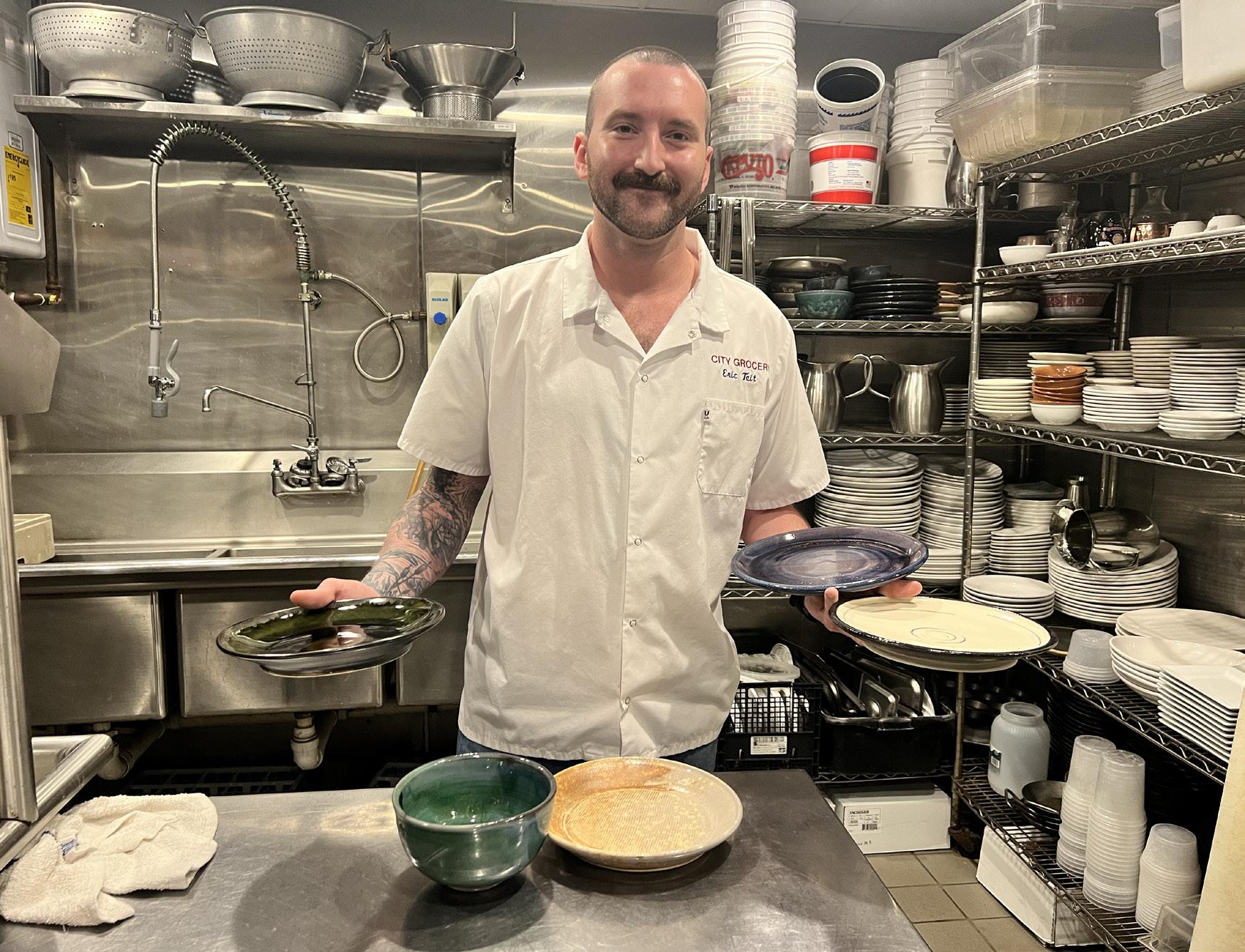
first time in October, and they gave the final project in December,” Tait said. “They got me out there on Halloween day, and they wanted me to come out there and see the process which was really cool. They made me get on the wheel and try to throw clay. God it’s so hard. I mean, it was surreal. I loved it.” Where is this?
With an eye for the culinary arts, Tait guided the potters in the process of plating in order for students to understand how to shape their creations into products suitable for serving dishes.
Although the students were encouraged to experiment with size and texture — from oblong to round and from vibrant to monochromatic — there was one condition: They could not be too heavy.
“We were talking about how one of the students’ plates could be a registered weapon.
I mean, the plate was like four or five pounds. So that was another thing we talked about, to keep in mind having to hold three plates on your arm and do that for about three or four hours,” Tait said. “Because you’re creating something to be both functional and admired.”
By the end of the fall semester, the students produced a number of handmade ceramic items that were gifted to City Grocery. The students dined together in December at the restaurant to celebrate their artistic achievements by sharing food prepared by Tait on their own handmade plates.
“The plates are, for me, the best the restaurant group has ever seen,” Tait said. “We do a specialized dinner, and I went a little above and beyond and did like a 12-course dinner for them and included the plate of every single person that participated on a different dish, so they could all see their work.”
Junior Southern studies major and City Grocery server Gracie Miester reflected on the dinner.
“I loved the tartar, that was my favorite. I thought it was such a fun experience because it was just our whole group of Mud Daubers — that’s what we called ourselves — and we got the chance to get really close and have a lot of fun,” Miester said.
Long summarized the Plate Project’s mission of bringing budding artists’ and experienced chefs’ creations to the forefront.
“Most importantly, this is about raising awareness, giving the community an understanding of the importance of the handmade, both the food and the plate, and hopefully bring(ing) a new level of confidence to the vision of the student,” Long said. “After all, who wouldn’t want their pots to be used by a chef at a great restaurant?”
UM Knitting weaves casual hobby into community service
STORY LEE thedmfeatures@gmail.com
On an average Thursday night, Lamar Hall might look barren: Hardly any lights are on and most of the classrooms are empty. But, tucked away in room 129, a small group of students meet to do their crafts and enjoy each other’s company. This is UM Knitting. Lynnzie Williams, a senior psychology major and the president of UM Knitting, is always ready to help newbies learn the ropes. She is one of seven board members for the group. With a friendly voice, she will tell any newcomer about the university’s only knitting club.
“On a typical day, (it is) a lot of gossiping and yarn work,” Williams said. But UM Knitting is much more than that.
Founded in February 2020 by Ole Miss alumni Claire Dosher and Sam Frankenfield, UM Knitting started as a fun way to utilize yarn hobbies for community service. Students would gather to knit baby hats to be donated to Baptist Memorial Hospital’s neonatal intensive care unit. Four years later, the club has expanded to include crochet, and members also make baby mittens alongside the hats.
Items are now donated to Blair E. Batson’s Children’s Hospital
in Jackson. With the help of their community service coordinator, senior biology major Maianh Tran, club members hope to expand their services and create adult-sized hats and mittens to donate to Oxford’s homeless community. She shares that those who participate can get community service hour credit for any organizations they are involved in that require them.
“It takes maybe two hours to knit a baby hat, and you (can) get two hours of community service hours for that,” Tran said.
The club is open to all skill levels, and beginners are encouraged to come in with little-to-no knowledge and knit-
ting supplies. Williams herself did not know how to knit when she joined the club last year.
“You don’t have to bring a single thing,” Williams said. “And we also do a (supply) checkout sometimes. We’re getting stricter with this semester, but if you wanted to, you can take it and then return it at our next meeting so you don’t have to go to Walmart and drop like $20 on supplies for a hobby that you may not commit to.”
Skillful members, like sophomore classics major Maggie Wallace, benefit just as much from UM Knitting’s guidance. Over the fall semester, Wallace crocheted five baby hats
to donate, but she had trouble finding a place for them to go.
“I didn’t know where to go, because everywhere I called would say, ‘Oh, no, we don’t need any right now.’ And I was like, okay, I’m just going to take them to knitting club. They know what to do with them.”
Members are connected by camaraderie and a shared passion for their volunteer work. They laugh and chat with each other as they work.
“It’s just a chill group,” Williams said. “It’s like no commitment. You could come one session or, like, one meeting and then not come to the rest of the semester if you don’t want to.”
PAGE 8 | THE DAILY MISSISSIPPIAN | 22 FEBRUARY 2024
City Grocery head chef Eric Tate holds plates created by university ceramics students on Feb. 2
CAROLINE MCCUTCHEN / THE DAILY MISSISSIPPIAN
University of Mississippi ceramics students’ handmade plates gifted to City Grocery
PHOTO COURTESY OF CITY GROCERY
Mostly what Savannah Guthrie does in her new book is share – often hilariously
CLAY HALE thedmfeatures@gmail.com
“TODAY” show anchor Savannah Guthrie released her new faith-oriented book, “Mostly What God Does,” on Tuesday, Feb. 20. To promote the book, Guthrie appeared at OffSquare Books on Friday, Feb. 16, and I just happened to be among the 100-plus attendees.
The subtitle “Reflections on Seeking and Finding His Love Everywhere” rings true, as Guthrie offers life experiences and how those moments were inherently spiritual and full of God’s love.
The lead argument and title of Guthrie’s new read stems from a passage in the Bible verse Ephesians 5:1-2, particularly from a translation known as “The Message.”
“Watch what God does, and then you do it, like children who learn proper behavior from their parents. Mostly what God does is love you…”
Guthrie uses this message as the theme of her book, which is split into six sections: love, presence, praise, grace, hope and purpose. She offers a foreword as well, but in a lot of ways, the entire first section of love feels like a prologue for the rest of the book.
The love section offers disclaimers and sets up the rest of the book, and it really hones in
on the humor. It feels like the beginning of an interview: The reader is the interviewer, probing Guthrie as she offers up her spiritual experiences. She breaks the ice in section one.
The humor throughout the first section and other early sections is also found within the formatting.
Guthrie will frequently break the fourth wall from her recollected stories and pull a sidebar (in the form of parentheses, like this). It feels personal and works well for a while, but she stops doing it as consistently in the last four sections — just at the perfect time, before it becomes too annoying for the reader.
Even so, Guthrie maintains a conversational tone throughout the book. She keeps the humor, too, but it happens less often and in a more “Okay, now that we know each other” kind of way. As she dives further into the story-sharing aspect, her sidebars feel more integrated into the book and less like a behind-the-scenes commentary from the author. This approach works better and makes her writing feel more authentic.
In chapter 20 and section four, she recounts a story about how a friend of hers felt that God had told them to stop drinking alcohol.
“I sure hope God never asks me to do that,” Guthrie said.
Guthrie feels personable in lines like this. Drinking, for many
in the religious community, can be considered taboo. Though the thought she shares is humorous, it is also rather candid. She tackles an uncomfortable topic — drinking alcohol — and takes a stance that she knows some people that share her faith will not agree with.
She does something similar in section one when making a joke about foul language.
“Less globally, more personally: feeling loved when confronting setbacks and disappointment and loss is damn near (can we curse in a book about faith?) impossible,” Guthrie said.
This wall-break works, and spoiler alert: She uses the same “damn” later on in the book, in keeping with the later sections’ conversational tone.
I admire that Guthrie is frank about using foul language and consuming alcohol in a book about faith. It calls out the hypocritically religious, and I commend her for it.
It felt like I was friends with Savannah Guthrie when I read this book. She cursed, she offered candid experiences and she found the beauty in each of those experiences. It was truly inspirational, though the humor was a bit heavy-handed in earlier sections.
I teared up at the end as Guthrie shared what she felt her purpose was (this is my favorite section of the book).
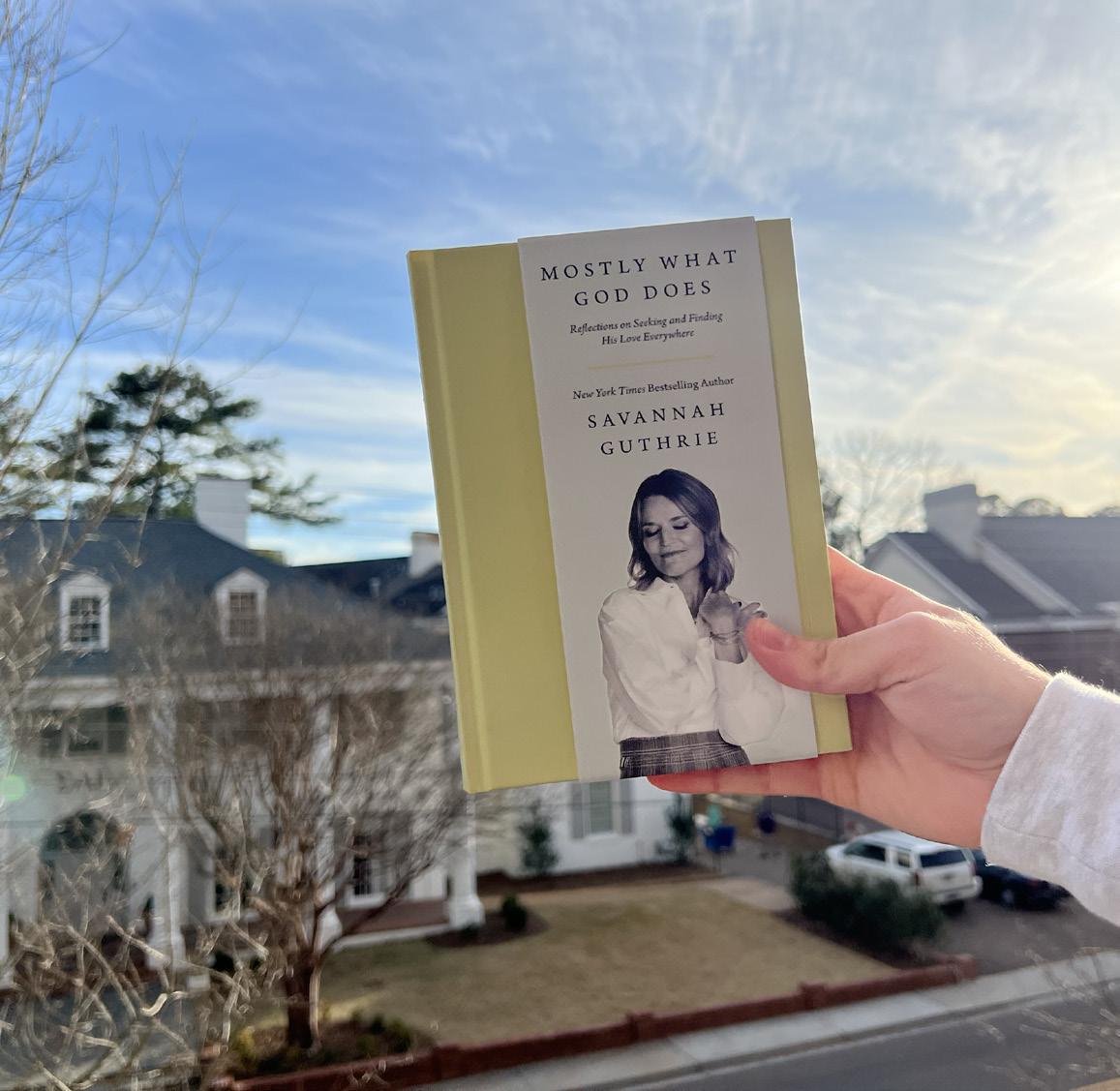
“It boils down to one word… Interestingly, it is the word I enter every day in Wordle as my first guess. Share,” Guthrie said. Guthrie shares early on in the book that “Mostly What God Does” is not a memoir. She does not seem interested in even writing a memoir, but the candid, intimate nature of the book almost makes it read like one. And
it is beautiful that she shares it.
“I am here in this moment to share my voice, my heart,” Guthrie said. “To share this truth, this single truth. A truth I need to hear as much as I needed to tell. A truth I need to believe as much as I need to share. Mostly what God does is love you.”
“Mostly What God Does” is available wherever you buy books now.

THE DAILY MISSISSIPPIAN | 22 FEBRUARY 2024 | PAGE 9
Savannah Guthrie’s new book, Mostly What God Does.
KENNEDI STANCIL / THE DAILY MISSISSIPPIAN
Baseball losing streak continues in home opener


CLASSIFIEDS INFORMATION
The DEADLINE to place, correct or cancel an ad is 12 p.m. one business day in advance. The Daily Mississippian is published on Thursdays during the academic school year.
Classified ads must be prepaid. All major credit cards accepted. No refunds on classified ads once published.
The DM reserves the right to refuse ads that appear to offer unrealistic or questionable products or services.
To place your ad in The Daily Mississippian Classifieds section, visit: http://www.thedmonline.com/classifieds.
Upon returning home from Honolulu, Hawaii, with a 2-2 record on the weekend, the Ole Miss Baseball team took another blow, losing to the Arkansas State Red Wolves on Wednesday, Feb. 21, for their third loss in a row to start the season 2-3.
The Red Wolves quickly earned a 1-0 lead in the top of the first inning off of an RBI single, but Ole Miss pitcher Mason Morris limited the damage to just one, closing out the inning strong. After a scoreless bottom half of inning one for Ole Miss, the Red Wolves third baseman Austen Jaslove, a transfer from Tennessee, hit a solo homerun to take Arkansas State to a 2-0 lead.
A quiet third inning for both teams led to yet another pair of runs from Arkansas State. Red Wolves right fielder Allen Grier brought in a runner with
the bases loaded via sacrifice fly, followed by an RBI single from leadoff batter Wil French.
The Rebels finally got the bats going in the fifth inning after an RBI single from designated hitter Jackson Ross for his first RBI as a Rebel; this made the score 4-1. Unfortunately, this was all Ole Miss could muster in that inning.
Right-handed pitcher Brayden Jones came into the game to quiet down the Red Wolves’ bats, holding them to zero in three straight innings. Jones also picked off a runner in the top of the seventh after giving up a leadoff single, negating the hit.
Ole Miss first baseman Judd Utermark sparked some offense for the Rebels in the eighth inning, cutting the lead to just two runs and forcing a pitching change. However, the first pitch from the new pitcher resulted in a double play to end the inning.
The Red Wolves hit a two-
SUDOKU©
Puzzles by KrazyDad

out single in the top of the ninth inning, followed by a walk, but right-handed pitcher Mason Nichols stranded the runners to keep Arkansas State at bay. With only five hits up to that point, the Rebels looked to make a last-minute comeback.
Unfortunately, Red Wolves pitcher Arlon Butts made quick work of the Rebels, earning Arkansas State their first win in Oxford since 2008 and their fifth straight win of the 2024 season. A disappointing game on both sides of the ball ended up in the Rebels’ third loss of the young season.
Ole Miss looks to bounce back as they host their first home series of the year on Friday, Feb. 23, at 4 p.m. against the High Point Panthers. A series sweep would put the Rebels back on track, but anything less would raise even more eyebrows, as concern for the state of the baseball team would skyrocket.
HOW TO PLAY
Complete the grid so that every row, column and 3x3 box contains the numbers 1 through 9 with no repeats.
DIFFICULTY LEVEL
TOUGH


ACROSS
1- New Mexico art colony; 5- ___ never work!;
9- Spanish snack;
13- Legal rights org.;
14- Mock, annoy;
16- Raw materials;
17- Golda of Israel;
18- Transmits;
19- Greek goddess of victory;
20- Starting; 21- Bambi’s aunt;
22- Washroom;
24- Building wings;
26- Respiratory organ;
27- Tribe ruler;
29- Abhorrence;
33- Steamed;
34- Heath;
35- Just right;
36- Encountered;
37- Coming down;
38- Sgt., for one;
39- Copycat;
41- Breezy;
42- Dens;
44- Tonic;
46- Therefore;
47- Chadic language;
48- Prepare for takeoff;
49- Manatee;
52- Women’s ___; 53- Exec’s note; 57- Pond organism; 58- Together; 60- King of comedy; 61- Garden pest; 62- New Mexico’s state flower; 63- ___ dancing is popular with cowboys!; 64- All there; 65- Fragments; 66- Lacking;
DOWN
1- Writer Janowitz; 2- Breezes through; 3- Assortment; 4- Excess; 5- In and of ___; 6- Mall frequenters; 7- Actress Turner; 8- Acid; 9- “West Side Story” number; 10- Seed cover; 11- Short dog, for short; 12- I’d hate to break up ___; 15- Tidal river; 23- Thunder Bay’s prov.; 25- Levi’s rival; 26- Crackers;


27- Fancy pancake; 28- Couldn’t stand; 29- France’s longest river; 30- Greek column type; 31- Bead material; 32- Old Pontiacs; 33- Muslim leader; 34- New Brunswick neighbor;
37- Railroad;
40- Enclosure formed by the chest bones; 42- Superman foe
Luthor; 43- Creatures;
45- Dove sound;
46- ___ corpus; 48- Color; 49- Cheek;
50- Actress Raines;
51- Son of ___!;
52- Centers of activity; 54- Charles Lamb’s nom de plume; 55- Jazz flutist Herbie;
56- Till bills;
59- Stand in;

PAGE 10 | THE DAILY MISSISSIPPIAN | 22 FEBRUARY 2024
locations! Apply in person - 1603 W Jackson Ave or 1920 University Ave also apply online at jobs.dominos.com
and tips
Flexible work schedule!
Make $20-$25 an hour! NOW HIRING DRIVERS at BOTH Oxford
Mileage
paid out daily!
CROSSWORD PUZZLE BROUGHT TO YOU BY DOMINO’S SOLUTION TO PUZZLE
Crossword puzzle provided by BestCrosswords.com (www.bestcrosswords.com). Used with permission.
LIVE @ 5 newswatcholemiss.com
GRIFFIN RAY thedmsports@gmail.com
Hayden Leatherwood warms up his teammates in the outfield
FILE PHOTO HG BIGGS/ THE DAILY MISSISSIPPIAN
Ole Miss Rugby Club celebrates 50th anniversary
At universities, clubs come and go as the student body cycles each academic year, but some groups have a bit more staying power. Celebrating its fifth decade of existence this spring, Ole Miss Men’s Rugby Club has stood the test of time.
Every year, the club hosts a reunion weekend to connect current members to alumni members. For junior mechanical engineering major and Ole Miss Men’s Rugby Vice President Race Davis, these connections keep the club tethered to its roots.
“It’s a great honor to be a part of a club that has such a long history at this university. I have had many great interactions with alumni from the club from all different age ranges. Without them, we wouldn’t be where we are today,” Davis said.
The reunion weekend includes events such as a match between the current squad and former members, who are affectionately known as the “old boys.” Additionally, a social is held to allow the players to better connect with the alumni off the field. This year’s events will take place on the weekend of March 23.
The club also encourages closer engagement with the opposing teams they face. Generally, after matches are played, the club will partake in socials with the opposing side.
Rugby is unique in the sense that it is a full-contact sport played without any padding. Because of the physicality of the sport, opponents often have a greater deal of respect for one another; this, in turn, creates a culture that values good sportsmanship.
This camaraderie is what junior management major and club President Kai Nihira loves most about playing rugby.
“Rugby has the tradition of hanging out with the opposing team after a game. The fact that we can go from beating each other up for 80 minutes at a time to having a laugh with the other team immediately after is something that not many other sports can offer,” Nihira said. “You dislike your opponent during the match, but afterward you will sing and hang out with them.”
While the club has existed for decades, it has faced challenges. Maintaining membership has been a problem in recent years. Last year, the team
was forced to forfeit a number of matches for lack of players.
However, a greater emphasis on recruitment and a large freshman class have helped the club bounce back this school year. The club normally has a group of about 20 players who come to practice regularly, while 25 to 30 players are available to play in matches.
The club has employed several recruitment strategies.
“We recruit players by posting on Instagram as well as by word of mouth,” Nihira said. “Rugby isn’t a big sport here in Mississippi, but in some parts of the country, it’s big. We also work with campus recreation to spread our message about joining the team.”
For Assistant Coach Trevor Reeves, who played for the club from 2018-2022, it is important to continue teaching younger players about what it means to play rugby at Ole Miss.
“When I joined, I was lucky to have experienced players and a coach to teach me the game and help make me better, so it was important to me to pay that forward,” Reeves said. “I think the more people I can get to be passionate about rugby at Ole
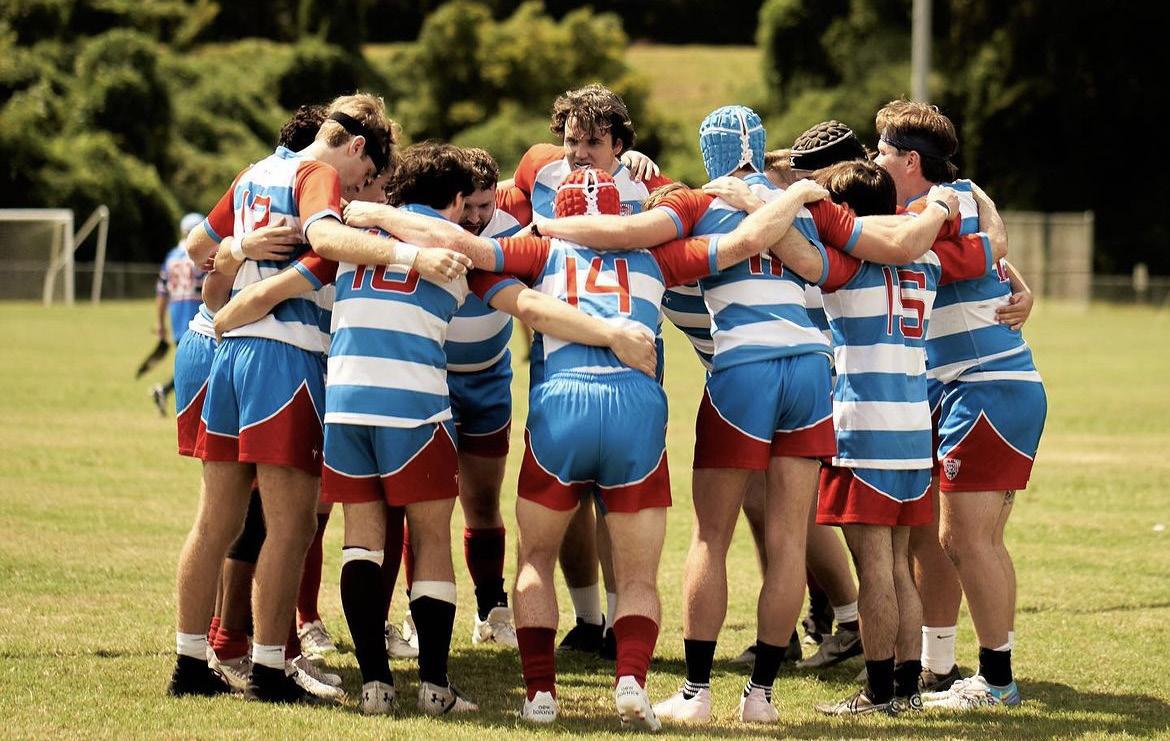
Miss, the better the experience will be for future generations.”
The club competes in Division II of the Southeastern Collegiate Rugby Conference, which falls under the purview of National Collegiate Rugby. Opponents include typical rivals such as Mississippi State University and Auburn University, but the team also frequently competes with other Southern schools such as the University of Memphis, Georgia Institute of Technology and Tennessee Tech University.
The squad plays home games at the Ole Miss Sport Club Fields on Insight Park Drive, where the team will host a tournament on Saturday, April 20.
In addition to their alumni reunion weekend and home tournament, the club will travel to various tournaments throughout the South for the spring season. A promising season for this squad includes trips to Huntsville, Ala., Memphis and Knoxville, Tenn.
Basketball teams enter crucial final stretch
University of Florida and longtime rival Mississippi State University.
Lady Rebels survive SEC play
In an exciting season with some painful losses and nail-biter wins, the Ole Miss Women’s Basketball team has made it known that they can compete.
After a 29-point loss to the No. 1 South Carolina Gamecocks on Feb. 4 and a 19-point loss to Texas A&M four days later, the Rebels bounced back with overtime wins against the
Head Coach Yolett McPhee-McCuin leads the Rebels with a fiery energy. Last season’s team reached the semifinals of the SEC tournament and advanced to the Sweet 16 in the NCAA Tournament for the first time since 2007 after defeating No. 1 seed Stanford 53-49.
Currently, the Lady Rebels sit at No. 4 in SEC conference play, just behind South Carolina, Louisiana State University and the Univer-

sity of Tennessee, with an overall record of 18-7. They hope to clench victory against the Georgia Bulldogs on Thursday, Feb. 22.

Ole Miss boasts a lot of talent, with point guard/forward Madison Scott, guard Kennedy Todd-Williams and guard Marquesha Davis consistently driving the action for the Rebels. In last week’s win over Mississippi State, Davis, Scott and Todd-Williams combined for a total of 53 points.
Scott reached her fourth consecutive game with double-digit points, scoring 20 and adding nine rebounds and three assists. Davis is the Lady Rebels’ most consistent scorer this season, finishing with 17 points, six rebounds, three assists, two blocks and two steals. Todd-Williams helped with 16 points and a season-best of 11 rebounds.
they prepare for the last four games in the regular season.
Ole Miss Men’s Basketball wraps up SEC play in high spirits
In the successful start to the Chris Beard era of Ole Miss Men’s Basketball, the Rebels have experienced both the highest of highs and the lowest of lows in conference play. Prior to the Rebels’ most recent 79-76 win over the University of Missouri, they fell to both the No. 17 Kentucky Wildcats and No. 20 South Carolina.

The March Madness buzz is getting louder for this team as
The men’s team has shown that they are strong competitors in a conference full of powerhouse teams like No. 5 Tennessee, No. 13 Alabama, No. 14 Auburn and No. 17 Kentucky. Beard and the Rebels are aiming for their first bid in the NCAA Tournament since 2019, but they will need a fairly clean finish to SEC
play to accomplish that goal.
In an exciting season so far, the Rebels have secured important SEC wins against No. 24 Florida, Arkansas and Mississippi State. Ole Miss sits at No. 7 in SEC rankings at 6-6, with six games left in conference play. Rebel guard Matthew Murrell matched his season-high in points — 26, to be exact — against Mizzou, including six three-pointers..
When Ole Miss and Mississippi State played on Tuesday, Jan. 30, a record breaking 10,630 fans packed the Sandy and John Black Pavilion, creating an electric environment. That energy ultimately helped Beard and Ole Miss hold out a close 86-82 win.

The Ole Miss Rebels played the Bulldogs again in Starkville, Miss. on Wednesday, Feb. 21, and will end the week at the SJB Pavilion on Saturday, Feb. 24, when they face South Carolina.
THE DAILY MISSISSIPPIAN | 22 FEBRUARY 2024 | PAGE 11 THE BUSINESS OF GOVERNMENT IS THE BUSINESS OF THE PEOPLE. GOVERNMENT IS THE BUSINESS OF THE PEOPLE. THE BUSINESS GOVERNMENT THE BUSINESS THE PEOPLE. Search thousands of government public notices published in dozens of Mississippi newspapers — all in one convenient location. Search thousands of government public notices published in dozens of Mississippi newspapers — all in one convenient location. Search thousands of public notices published of Mississippi newspapers — all in one convenient MSPUBLICNOTICES.ORGMSPUBLICNOTICES.ORG A free service of the Mississippi Press Association and your local newspaper A free service of the Mississippi Press Association and your local newspaper A free service of the Mississippi and your local newspaper
JAKE DALEY thedmsports@gmail.com
The Ole Miss Men’s Rugby team huddles before a match.
PHOTO COURTESY JAKE DALEY
TEDDY KING thedmsports@gmail.com
The Pavilion during a game against Norfolk on Nov. 12, 2019.
FILE PHOTO: BILLY SCHUERMAN / THE DAILY MISSISSIPPIAN
Big business deals could yield small returns for Mississippians
DAVID RAMSEY thedmopinion@gmail.com
Mississippi Gov. Tate Reeves has recently announced an economic development deal that soars past the state’s previous investment record. The new deal will bring two Amazon Web Service locations into Madison County, a project totalling $10 billion. Reeves boasts that 1,000 jobs will be created by the new job sites. The deal will also benefit companies like Entergy, which will power the Amazon centers.
We must ask ourselves two questions before accepting the deal at face value: How will this project affect taxpayers, and how will this affect Mississippians?
The answer to the first question is a brief one: $44 million taxpayer dollars will be spent on the creation of this large project, but Bill Cork, executive director of the Mississippi Development Authority, says this money would be made back in
Opinion Policies:
as soon as 10 months after the implementation of the project.
The second question is unfortunately a much more nuanced one; we will not truly understand the impact to Mississippians until the development project has come to fruition.
Reeves claims that 1,000 jobs will be created in two new locations, but it has not been made clear how many of these jobs will be filled by Mississippians. When passing the bill to clear the project, Democrats in the state legislature attempted to write in that 25% of the new jobs created must employ Mississippians. However, Republicans shot down the proposal and passed the bill without the addendum. As it stands, there is no guarantee that these new jobs will be filled by Mississippi workers.
Another alarming factor is the misleading efficiency of mega-tech projects like this one. Some studies have shown that while big tech companies
promise the moon, they deliver little in terms of employment and economic stimulus to their host state. The best jobs are usually taken by outsiders.
With this in mind, Reeves’ new project likely will not assist in retaining STEM students with relevant degrees, thus brain drain will continue. This sort of project may not be the best for fostering sustainable growth in the state in the first place.
Think of it like this: The new project creates 1,000 jobs with the snap of a finger, jobs that require (or prefer) extensive experience in the field and a degree from a renowned STEM university. There are not many people who fit either of those descriptions in Mississippi.
These are the major problems with the Amazon project that need to be addressed.
It is easy to get lost in the weeds talking about the economic input and output of a project, but we must take an honest, comprehensive
look at the deal and how it affects real Mississippians, all without being dazzled by meaningless buzzwords like “big tech” and “job creation.”
Reeves’ claim that the project will bring unprecedented economic development should be carefully examined before Mississippians fully buy into the deal. For decades, Mississippi was overlooked by large corporations. These big businesses asked themselves, “Why would we invest millions of dollars into an underdeveloped state?” Though the tide has begun to turn in recent years, I wonder whether or not this is a result of lawmakers’ eagerness and naivety.
This, however, is not to say that there are no benefits from the deal. Obviously, increased employment and economic stimulation will come from the project (although to what degree is debatable), but school districts in Madison County will also benefit. It is estimated that $30 million will be given
to the C-rated Canton school district and $10 million given to the Madison County school district. Also, improved infrastructure is touted as a benefit of this project, which will indirectly create more jobs.
It can be easy to poke holes in such a large economic development project, but the important takeaway is that this plan is a step in the right direction. Economic development in Mississippi has long been the basis of Reeves’ political platform, and he is taking steps to realize it.
Will Amazon be our savior? Time will tell, but this is no doubt an important time in Mississippi’s history. The costs and benefits of Amazon’s new developments will help determine how the state’s comeback story is told.
David Ramsey is a public policy leadership major from Madison, Mississippi.
Columns do not represent the views of The University of Mississippi or The Daily Mississippian. The Daily Mississippian welcomes letters to the editor, which should be emailed to thedmopinion@gmail.com. Letters should be no longer than 300 words. They may be edited for clarity, brevity and libel. Third-party letters and those with pseudonyms or no name will not be published. Letters are limited to one per individual per month. Letters should include contact information, including relationship to the university, if applicable.

PAGE 12 | THE DAILY MISSISSIPPIAN | 22 FEBRUARY 2024




































